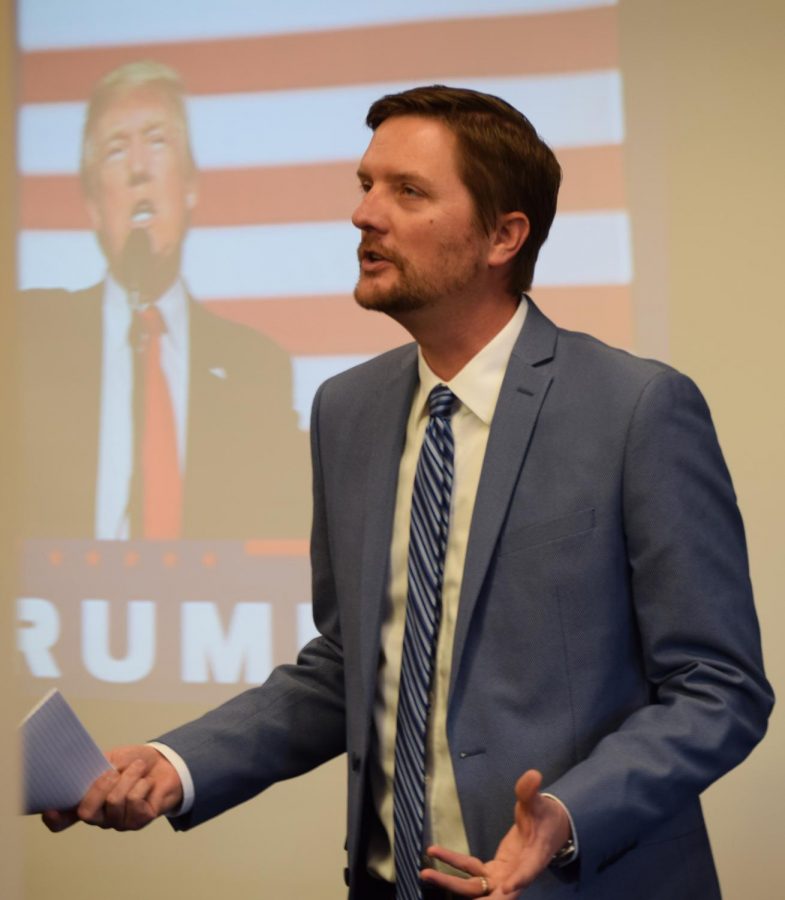Professor explains Trump, Christianity link
Evangelicals hopeful for future, agree with Trump’s rhetoric
MICHAEL LINDER | The Daily Evergreen
Matthew Sutton, talks to students about how Trump took advantage of the evangelical demographic through his ideology.
February 8, 2018
Religious history professor Matthew Sutton led a discussion Wednesday explaining why President Donald Trump was such an attractive figure to white Evangelicals, winning about 81 percent of their vote in the 2016 election.
Sutton, an Edward R. Meyer Distinguished Professor and graduate studies director in WSU’s department of history, said many Evangelicals in the 19th century tended to be optimistic. He said they were forward-thinking and hopeful, he said. They believed that they could help build the kingdom of God in the U.S. and establish what the Bible describes as the millennium, a thousand years of peace, prosperity, justice, goodness and righteousness.
He said they were also involved in all kinds of social reform such as missionary movements, temperance movements and women’s rights; some of them fought for slave’s rights, and after the Civil War, African Americans’ rights.
“But between the Civil War and the turn of the 20th century, this optimism began to fade among some Evangelicals,” Sutton said.
In the following years, the U.S. experienced substantial immigration. The immigrants were significantly more Catholic and more Jewish.
Sutton said in the 19th century, Evangelical Americans became more aware of the fact that not everybody in the world was Christian. This made them question how unique or special Christianity was. For some, he said, this was a threat and a challenge.
“They began to have this pessimistic worldview that they were heading toward something bad,” Sutton said. “Then when they come out of it, they will have the kingdom of God on Earth.”
Sutton went on to explain why Evangelicals of that era were almost entirely white.
“Some African Americans were engaging with their theology,” he said, “but theology was not as important as race, and so they were almost entirely segregationists.”
Having originally been called fundamentalists, which carries a negative connotation, they wanted to rebrand themselves as Evangelicals, he said, which marks the rise of modern Evangelicals.
The Supreme Court decision in the 1960s that removed mandatory Bible readings from public schools put Evangelicals on the defensive, Sutton said. Students were also being exposed to same-sex relationships, masturbation and other controversial issues in school.
Sutton said this theology is so effective because it gives Evangelicals the sense that they know what is happening in the world around them.
“Whether it’s global warming or North Korea, they can say why the world looks evil because of what the Bible prophesies,” Sutton said. “Even more, they know that their future will be better, that they are going to be the ones who are winners and have the last laugh.”
Sutton then pointed out that Trump’s emphasis on keeping America Christian, through using phrases such as “merry Christmas” and not “happy holidays,” is appealing to Evangelicals.
“This fits into Evangelicals’ worries about the judgement of God,” Sutton said. “If you’re afraid God is going to judge the country, you want your country to be as Christian as possible.”
Sutton said Trump’s anti-immigrant and anti-Muslim standpoints fit with Evangelicals’ sensibilities because immigrants from other religions came in large numbers in the past. He also said all the ideas of Evangelicals were set in place by the late 1940s, but no politician has appealed to them as well as Trump has.
“Trump is not an Evangelical, doesn’t even pretend to be one,” he said, “but his policies and ideas that he’s promoting are things Evangelicals are attracted to.”





















